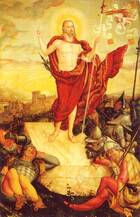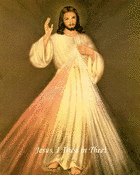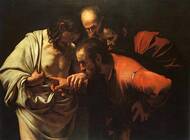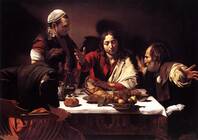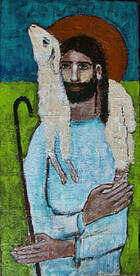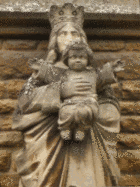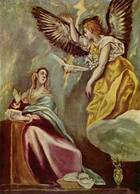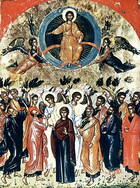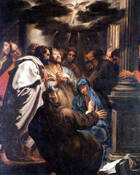Sunday Evangelium in the Season of Easter
Here are the homilies given by Father Andrew Pinsent and Father Marcus Holden during Eastertide (from Easter Sunday through to Pentecost). Liturgical 'Year A' began on 1st Sunday of Advent, 1 December 2013.
You can subscribe to this Totus2us podcast here on the RSS web feed or here on itunes. Plus you can download the free mp3 audio recordings individually by right/double clicking on the blue play buttons.
Easter Sunday
by Father Marcus Holden, in Year A ![]()
"There comes a time in our lives when we begin to have faith. We come to believe on the testimony of the Apostles or on the universal testimony of the Church. Then we can begin to see not only the resurrection as a fact, as a historical matter, but see the significance of these events, their meaning, what they stand for, for us, and for the world, and for everything. Not just a great miracle, a wonderful bloke coming back to life, not merely a grand proof of all he taught, not only a sign of life beyond the grave, nor just of God's presence amongst us. But what we are talking about here is a new beginning, a new creation, human life transformed, renewed, glorified and communicated to us."
Gospel Reading - Jn 20:1-9: "On the first day of the week, Mary of Magdala came to the tomb early in the morning, while it was still dark, and saw the stone removed from the tomb. So she ran and went to Simon Peter and to the other disciple whom Jesus loved, and told them, “They have taken the Lord from the tomb, and we don’t know where they put him.” So Peter and the other disciple went out and came to the tomb. They both ran, but the other disciple ran faster than Peter and arrived at the tomb first; he bent down and saw the burial cloths there, but did not go in. When Simon Peter arrived after him, he went into the tomb and saw the burial cloths there, and the cloth that had covered his head, not with the burial cloths but rolled up in a separate place. Then the other disciple also went in, the one who had arrived at the tomb first, and he saw and believed.
Divine Mercy Sunday
by Father Andrew Pinsent, in Year A ![]()
"Since the Great Jubilee of 2000 this, the second Sunday of Easter, has been called Divine Mercy Sunday. The Divine Mercy is a devotion centred on the infinite mercy of God for sinners. It's visual focus being an image painted under the guidance of a Polish nun, St Faustina Kowalska. St Faustina had an inspired vision of blood and water radiating from the pierced heart of Jesus Christ. Seeing these white and red rays as an ocean of mercy for the whole world. Pope John Paul II strongly encouraged this devotion. His death on the vigil of Divine Mercy Sunday 2005 and his subsequent beatification on this same feast day in 2011 may also be interpreted as signs of the importance of this devotion today."
Gospel Reading - Jn 20:19-31: "Now a week later his disciples were again inside and Thomas was with them. Jesus came, although the doors were locked, and stood in their midst and said, “Peace be with you.” Then he said to Thomas, “Put your finger here and see my hands, and bring your hand and put it into my side, and do not be unbelieving, but believe.” Thomas answered and said to him, “My Lord and my God!” Jesus said to him, “Have you come to believe because you have seen me? Blessed are those who have not seen and have believed.”
by Father Andrew Pinsent, in Year C ![]()
The Wounds of the Risen Christ
"In today’s Gospel we have one of the most famous, perhaps the most famous, of all the accounts of the resurrection appearances of Jesus Christ. Thomas does not believe the resurrection and he sets a test for believing that Jesus has risen, “Unless I see the mark of the nails in his hands and put my finger into the nailmarks and put my hand into his side, I will not believe.” A few days later, Jesus himself appears and invites Thomas to conduct his test, to which Thomas responds, “My Lord and my God!” Now this appearance of Jesus, with a body and wounds, emphasizes that the Resurrection is physical: the risen Christ is not a ghost or disembodied soul or mere symbol of the continuation of the Christian message. There is, nevertheless, something of a mystery about Christ's risen body. If Jesus has the power to rise from the dead, why does he still bear the wounds of the cross? Furthermore, what do the wounds of the risen Christ imply for our own vocation as followers of Christ?"
Readings: Gospel - John 20:19-31: .. Thomas, called Didymus, one of the Twelve, was not with them when Jesus came. So the other disciples said to him, "We have seen the Lord." But he said to them, "Unless I see the mark of the nails in his hands and put my finger into the nailmarks and put my hand into his side, I will not believe." Now a week later his disciples were again inside and Thomas was with them. Jesus came, although the doors were locked, and stood in their midst and said, "Peace be with you." Then he said to Thomas, "Put your finger here and see my hands, and bring your hand and put it into my side, and do not be unbelieving, but believe." Thomas answered and said to him, "My Lord and my God!" Jesus said to him, "Have you come to believe because you have seen me? Blessed are those who have not seen and have believed." ...
3rd Sunday of Easter
by Father Andrew Pinsent, in Year A ![]()
"In today's Gospel, two disciples spend some hours speaking with Jesus but they only recognise him when he breaks the blessed bread at table and hands it to them. In that moment of recognition, Jesus is obviously underlining the link between the Eucharist and his real presence, by which he will be recognised subsequently in the sacrifice of the Mass. This encounter raises the question however of why Jesus chooses to reveal the truth of his resurrection gradually and at intervals to various different groups. St Bede the Venerable, the Father of English history, argued that the miracle was so great that human souls could not take it in all at once but had to be led to belief gently. In today's homily I argue that the sequence of Jesus's resurrection appearances follows a well-ordered narrative. Following a reconstruction of events first proposed by St Augustine, I further propose that this narrative is that of the Beatitudes by which a soul is transformed and becomes ready for heaven."
Readings: Gospel - Luke 24: 13-35 - As they approached the village to which they were going, he gave the impression that he was going on farther. But they urged him, “Stay with us, for it is nearly evening and the day is almost over.” So he went in to stay with them. And it happened that, while he was with them at table, he took bread, said the blessing, broke it, and gave it to them. With that their eyes were opened and they recognized him, but he vanished from their sight. Then they said to each other, “Were not our hearts burning within us while he spoke to us on the way and opened the Scriptures to us?”
4th Sunday of Easter, Vocation Sunday
by Father Andrew Pinsent, in Year A ![]()
"When Jesus says in today's Gospel "I have come that they may have life and have it to the full" the word he uses is not life in the usual sense. The word he uses is reserved in the Gospel for the life of grace, the life of the Holy Trinity and this life is why Jesus is unique. God in the pagan world and indeed in many religions today was perceived as remote and inscrutable, at best a source of benefits but unknowable in himself. The message of the Gospel is that God has bridged this unthinkable abyss by coming among us as a man. Through Jesus alone it has become possible to know God personally, to become children of God and that is why the Our Father is a uniquely Christian prayer. To know and to love God in this way is to taste eternal life already, in a state of pilgrimage in this life and in a state of glory in the next. Since the incarnation is unique, there is only one gate to the sheepfold."
Readings: Gospel - John 10: 1-10 - Jesus said again, “Amen, amen, I say to you, I am the gate for the sheep. All who came before me are thieves and robbers, but the sheep did not listen to them. I am the gate. Whoever enters through me will be saved, and will come in and go out and find pasture. A thief comes only to steal and slaughter and destroy;I came so that they might have life and have it to the full."
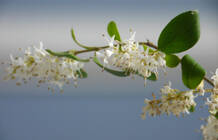
by Father Andrew Pinsent, in Year B ![]()
Nature and Grace
"The grace of Our Lord Jesus Christ, the Love of God and the Communion of the Holy Spirit be with you all.” These words show how a reference to ‘grace’ begins the Mass, after the invocation of the Trinity. A reference to grace appears also in the Hail Mary, in which Mary is described as being ‘full of grace’ and Catholics of an older generation may be familiar with the phrase ‘state of grace’. The principle of grace underpins today’s Readings and the idea of Christian vocation, especially pertinent to today’s World Day of Prayer for Vocations. But what is grace and why is it important?"
Readings: Gospel: John 10: 11-18: .. I am the good shepherd, and I know mine and mine know me, just as the Father knows me and I know the Father; and I will lay down my life for the sheep. I have other sheep that do not belong to this fold. These also I must lead, and they will hear my voice, and there will be one flock, one shepherd. This is why the Father loves me, because I lay down my life in order to take it up again. No one takes it from me, but I lay it down on my own. I have power to lay it down, and power to take it up again. This command I have received from my Father."
Mary, in her month of May
"J.R.R. Tolkien, who wrote the most popular work of the 20th century, The Lord of the Rings, said that his whole conception of beauty, both in simplicity and in majesty, was inspired by Mary. So our devotion to Mary is not a side-show, a nostalgic piety or something interesting for those who like history. It's right at the heart of our spiritual warfare. Mary stands for the truth about humanity. She reminds us, through her Son, that we are made in the image of God and called to glory. She reminds us that our hearts are for God, to be dedicated with purity, the meaning of our bodies is a spousal one. She also teaches us that the child in the womb is precious and to be defended at all costs. All the challenges of the day are met through her example."
6th Sunday of Easter
by Father Andrew Pinsent, in Year A ![]()
"My own suggestion of an answer to the question of why so few Christians experience the Holy Spirit is the following: the Holy Spirit is experienced mainly in divinely inspired action but very few Christians are willing to surrender to divinely inspired action. On the contrary we want to remain in complete control of our lives, not loving with God the things that God loves. Many of us, to a greater or lesser extent, are like the people that Jesus first encounters in the Gospels. We of course want God to help us and to heal us but mainly so that we can then get on with our lives in peace and prosperity. God will of course help us often in material ways but God wants us to go further than this. He wants us to surrender our whole lives over to Him, to really be able to say "Thy Will be done." This surrender is an entirely different matter from asking for gifts of any kind and it is something we tend to find very hard. This is I think why the coming of the Holy Spirit is the final revelation of the Godhead. This is also why the coming of the Holy Spirit lies on the far side of Calvary, the ultimate surrender to the will of God. So I have what might seem a slightly strange prayer to finish: 'May God help us to cease to resist Him so that we do only what is pleasing to God for the love of God.' In this as in all things Mary is our supreme example: "I am the handmaid of the Lord. May it be done to me according to Thy Word.""
Readings: Gospel - John 14: 15-21 - .. I will ask the Father, and he will give you another Advocate to be with you always, the Spirit of truth, which the world cannot accept, because it neither sees nor knows it. But you know it, because it remains with you, and will be in you.
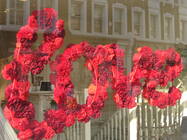
by Father Marcus Holden, in Year B ![]()
on Love
"All the messages of the readings today are about love. There's an ancient story about St John the Apostle who, throughout his writings, had only one theme: the love of God and the love of neighbour. Someone once asked him, 'Why do you not write about other things' and his response was 'There is only love, there is nothing more.' You see, love is at the centre of everything, like the hub at the centre of the wheel; the spokes are like the doctrines, the commandments, the good works, but they all come from the centre which is love. .... So what kind of love are we talking about when Jesus says 'Abide in my love' and 'Love one another as I have loved you'? It's his love but what kind of love is this? Well, it's the love of loves. It has a unique name in Greek called agape, This goes beyond the basic commandment to love God and neighbour in any conventional sense. It's a love that is godly, giving and gratuitous."
Readings: Gospel: John 15: 9-17: As the Father loves me, so I also love you. Remain in my love. If you keep my commandments, you will remain in my love, just as I have kept my Father's commandments and remain in his love. I have told you this so that my joy may be in you and your joy may be complete. This is my commandment: love one another as I love you. No one has greater love than this, to lay down one's life for one's friends. You are my friends if you do what I command you. "
The Solemnity of the Ascension of the Lord
by Father Andrew Pinsent, in Year A ![]()
"The Ascension helps to teach us about our true and final home, but Scripture also suggests that it brings us spiritual benefits as well. We do not fully understand these benefits but we are told that Christ has entered the heavenly sanctuary as our High Priest. Christ has appeared before God on our behalf, bringing His own blood as a living sacrifice that takes away our sins. When, during the Mass, Jesus Christ is present on the altar as our sacrifice, we also participate in an activity in heaven. Another way of understanding this connection is by an image given to us by St Catherine of Siena. St Catherine saw a vision of Christ as a great bridge stretching from earth into heaven. Christ remains present to us here through the Church and the Sacraments. But Christ after his ascension is also in the presence of the Father in His human nature, so the Ascension completes the span of the bridge."
Readings: Gospel - Matthew 28: 16-20 - The eleven disciples went to Galilee, to the mountain to which Jesus had ordered them. When they saw him, they worshiped, but they doubted. Then Jesus approached and said to them, "All power in heaven and on earth has been given to me. Go, therefore, and make disciples of all nations, baptizing them in the name of the Father, and of the Son, and of the holy Spirit, teaching them to observe all that I have commanded you. And behold, I am with you always, until the end of the age."
[The Feast of the Ascension is celebrated at the Vatican (& in most countries) on the Thursday, 40 days after Easter Sunday and 9 days before the Feast of Pentecost (the original novena of prayer). A few countries have moved the feast day to the following Sunday, but there are mutterings that it will be switched back again.]
by Father Andrew Pinsent, in Year B ![]()
Bridging Heaven and Earth
"While the human mind can range over space and time, the present human body is bound to an essentially two-dimensional existence. What the Ascension of Jesus shows us, first, is that the Resurrected human body does not suffer from this limitation: the Resurrected body can go wherever the beatified soul desires. Indeed, a distant echo of this yearning can be seen in the way that the superheroes of popular culture, in particular the superman, a distant derivative of the work of Nietzsche, are almost always portrayed as being capable of flight. What is most significant about the Ascension, however, is that Jesus' human nature is alos described as sitting at the right hand of God. In an image given to us by St Catherine of Siena, it is as if the human nature of Jesus Christ has become like a great bridge, stretching from our present earthly life into the presence of God in heaven. This bridge completes the process of opening a way for human beings to attain eternal happiness: the soul being saved by the sacrifice of Chrst's death, the body being saved and glorified by Christ's Resurrection, and the offer of being raised into a new world being made by Christ's Ascension."
Readings: Gospel: Mark 16:15-20: .. So then the Lord Jesus, after he spoke to them, was taken up into heaven and took his seat at the right hand of God. But they went forth and preached everywhere, while the Lord worked with them and confirmed the word through accompanying signs.
Pentecost
by Father Marcus Holden, in Year A ![]()
"This feast of Pentecost is the birthday of the Church, it's our birthday. We often think of the Holy Spirit as a personal gift to the individual Christian but more fundamentally the Holy Spirit is first of all a gift to the whole Church and then secondly to all of its members. Without the Holy Spirit, the Church is like a body without life in it, without breath. Just as the principle of life in a human body, the soul helps it to grow and develop organically, to expand and yet remain the same subject, so the Holy Spirit with the Church. The Holy Spirit is called 'the soul of the mystical body by theologians, the soul of the Church. Think of that first Pentecost - the disciples are a rather dishevelled body, they lack confidence, courage, know-how, zeal. It is the Holy Spirit descending upon them who animates them, vivifies them, makes them living members of the mystical body."
Music - Veni Sancte Spiritus by the Poor Clare Sisters TMD. Readings: Gospel - John 20: 19-23 - On the evening of that first day of the week, when the doors were locked, where the disciples were, for fear of the Jews, Jesus came and stood in their midst and said to them, "Peace be with you." When he had said this, he showed them his hands and his side. The disciples rejoiced when they saw the Lord. Jesus said to them again, "Peace be with you. As the Father has sent me, so I send you." And when he had said this, he breathed on them and said to them, "Receive the holy Spirit. Whose sins you forgive are forgiven them, and whose sins you retain are retained.""

